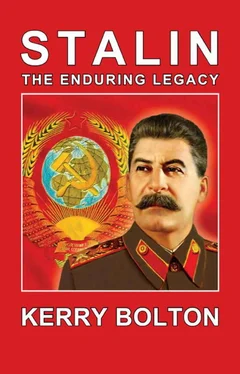Should the Cold War, which only really had a thaw during the Gorbachev and Yeltsin interregnum, reach and even surpass the intensity of that of the 1950s and 1960s, as Russia seeks to reassert its position as a world power, the American radical Right, and indeed factions of the radical Right around the world, can be expected to intensify this pro-Russian outlook as they continue to see the potential of a revived Russia as a bulwark against a regime that is seen as more ‘Semitic’ than ‘American’.
K R Bolton has doctorates in theology and related areas, Ph.D. honoris causa and certifications in psychology and social work studies. He is a Fellow of the Academy of Social and Political Research (Athens), and a Member of T3 Indian Defence Research, a ‘contributing writer’ for Foreign Policy Journal, and a regular columnist for The Great Indian Dream (Indian Institute of Planning and Management) and New Dawn (Australia). He has been widely published by the scholarly and broader media.
Books include:
Revolution from Above (Arktos Media Ltd., 2011),
The Parihaka Cult (Black House Publishing, 2012),
Artists of the Right (Counter-Currents Publishing, 2012).
STALIN
The Enduring Legacy
Kerry Bolton
Copyright © 2012 Black House Publishing Ltd
All rights reserved. No part of this book may be reproduced in any form by any electronic or mechanical means including photocopying, recording, or information storage and retrieval without permission in writing from the publisher.
Black House Publishing Ltd Kemp House
152 City Road
London
UNITED KINGDOM
EC1V 2NX
www.blackhousepublishing.co.uk
Email: info@blackhousepublishing.co.uk
Oswald Spengler, The Hour of Decision (New York: Alfred A Knopf, 1963), 61.
K R Bolton, ‘Jünger and National-Bolshevism’ in Jünger: Thoughts & Perspectives Vol. XI (London: Black Front Press, 2012).
Association for the Study of the Planned Economy of Soviet Russia.
League of Professional Intellectuals.
K R Bolton, ‘Jünger and National-Bolshevism’, op. cit.
Cited by John J Stephan, The Russian Fascists (London: Hamish Hamilton, 1978), 338.
K R Bolton, ‘Francis Parker Yockey: Stalin’s Fascist Advocate’, International Journal of Russian Studies, Issue No. 6, 2010, http://www.radtr.net/dergi/sayi6/bolton6.htm
See Chapter III: ‘The Moscow Trials in Historical Context’.
R Service, Comrades: Communism: A World History (London: Pan MacMillan, 2008), 97.
Ibid., 98.
Ibid., 107.
Ibid., 109.
Ibid., 116.
G Dimitrov, Dimitrov and Stalin 1934-1943: Letters from the Soviet Archives, 32, cited by R Service, ibid., 220.
R Service, ibid., 220.
G Dimitrov, op. cit., cited by Service, ibid., 221.
R Service, ibid., 222.
Ibid.
Hungarians.
Richard Overy, The Dictators: Hitler’s Germany and Stalin’s Russia (London: Allen Lane, 2004), 201.
L I Shvetsova, et al. (eds.), Rasstrel’nye spiski: Moskva, 1937-1941: …Kniga pamiati zhertv politicheskii repressii. (‘The Execution List: Moscow, 1937-1941: …Book of Remembrances of the victims of Political Repression’), (Moscow: Memorial Society, Zven’ia Publishing House, 2000), 229.
L Sedov, ‘Why did Stalin Need this Trial?’, The Red Book on the Moscow Trials, http://www.marxists.org/history/etol/writers/sedov/works/red/ch01.htm
Ibid., ‘Domestic Political Reasons’.
R Service, op. cit., 240-241.
Ibid., 242.
Ibid.
Ibid.
Given that when Trotsky was empowered under Lenin he established or condoned the methods of jurisprudence, concentration camps, forced labour, and the ‘Red Terror’, that were later to be placed entirely at the feet of Stalin.
Karl Marx, ‘Proletarians and Communists’, The Communist Manifesto, (Moscow: Progress Publishers, 1975), 68.
K R Bolton, ‘The State versus Parental Authority’, Journal of Social, Political & Economic Studies, Vol. 36, No. 2, Summer 2011, 197-217.
K Marx, Communist Manifesto, op. cit.
See Chapter V.
L Sedov, op. cit., ‘Reasons of Foreign Policy’.
L Trotsky, The Revolution Betrayed, Chapter 7, ‘Family, Youth and Culture’, http://www.marxists.org/archive/trotsky/1936/revbet/ch07.htm
K R Bolton, ‘The Psychopathology of the Left’, Ab Aeterno, No. 10, Jan,-March 2012, Academy of Social and Political Research (Athens), Paraparaumu, New Zealand. The discussion on Marx and on Trotsky show their pathological hatred of family.
L Trotsky, The Revolution Betrayed, op. cit., ‘The Thermidor in the Family’.
‘There is no proletarian, not even a communist, movement that has not operated in the interests of money, in the directions indicated by money, and for the time permitted by money◦– and that without the idealist amongst its leaders having the slightest suspicion of the fact’. Oswald Spengler, The Decline of The West (London: George Allen and Unwin, 1971),Vol. II, 402.
L Trotsky, op. cit.
Ibid.
Ibid.
Ibid.
Ibid.
Ibid.
Ibid.
Ibid.
Ibid.
See below.
A laudatory article on the ‘Dalton Plan’ states that the Dalton School was founded in New York in 1919 and was one of the most important progressive schools of the time, the Dalton Plan being adopted across the world, including in the USSR. It is described as ‘often chaotic and disorganized, but also intimate, caring, nurturing, and familial’. Interestingly it is described as a synthesis of the theories of John Dewey and Carleton Washburne. ‘Dalton School’, http://education.stateuniversity.com/pages/1902/Dalton-School.html
Dewey along with the Trotsky apologist Sidney Hook (later avid Cold Warrior and winner of the American Medal of Freedom from President Ronald Reagan) organised the campaign to defend Trotsky at the time of the Moscow Purges of the late 1930s. See Chapter II below.
A Zhdanov, Speech at the discussion on music to the Central Committee of the Communist Party SU (Bolshevik), February 1948.
Читать дальше












